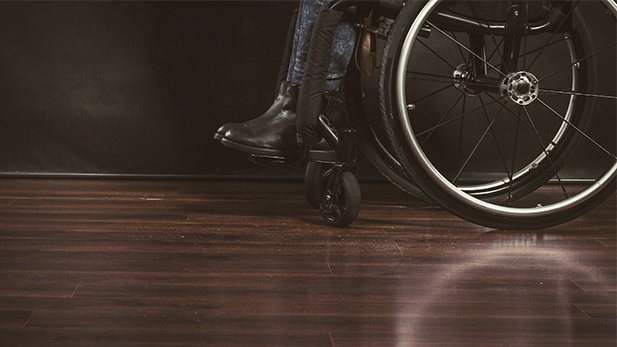Physically disabled people in job risk victimization

Photo: Shutterstock
You’re walking down the hallway at work. Your disabled co-worker is coming towards you and drops something – should you help pick it up? According to Professor Nanna Mik-Meyer this situation puts employees in a dilemma. On the one hand, many people would like to help out but, on the other, they want to pretend they didn’t see anything because they don’t want to draw attention to the fact that their co-worker is different.
New research from the Department of Organization at CBS and SFI The Danish National Centre for Social Research indicates that workplaces risk unintentionally maintaining the disabled individual in the role of a child or someone who is helpless, which is a role co-workers are not normally given. Her qualitative study on people with cerebral palsy employed in 13 Danish workplaces shows that there is a tendency for this relationship to occur automatically between the disabled individual and other co-workers because of stereotypical assumptions about people with disabilities, a fear of talking about the disability and a clumsy approach to showing care for the co-worker with a disability.
“There’s a difference between help and care. Momentary help does not fundamentally affect the relationship with the co-worker with a disability when, for example, you pick up papers dropped on the floor. The issue that I problematised in this research project involves another kind of help comparable to the care we show our children, which is why it more greatly fundamentally challenges the balance of equality between co-workers,” explains Mik-Meyer about the study co-financed by The Elsass Foundation.
Mik-Meyer contacted employees with physically visible cerebral palsy and asked if they would like to participate in a research project and ask their bosses and colleagues to participate. From 2012-2013, while a professor with special responsibilities at CBS, she interviewed the three groups about the significance of disabilities in the workplace. Currently on leave from CBS, Mik-Meyer works at SFI, where she completed her research, which was published in the journals Human Relations, Work, employment & society and Gender, Work & Organization.
The three research articles describe how disabled colleagues were referred to, for example, as “sweetie” and “teddy bear”. In another example from her research, a female co-worker describes how she advised a male co-worker with cerebral palsy about how to dress. He expended a good deal of energy when he moved around, which made him sweat rather profusely. She talks about how she found it completely natural to tell him to wait to change his shirt until just before an event at work. She even went on to offer to help him button his shirt.
“This type of care is perhaps nice – for a little while. But I think that most people realise this type of concern is unacceptable. Employees who aren’t disabled can experience periods where they’re shown special consideration, for example, if they’re going through a divorce or have just lost a close family member. The difference, however, is that this type of care is only extended for a shorter period of time, which most people are probably happy with,” says Mik-Meyer, adding:
“Being physically disabled, however, is not a temporary identity, which is why it can entirely overshadow one’s work identity. As a result, co-workers and bosses must think about how they behave toward a co-worker with a disability.”
Mik-Meyer also asked the disabled employees what they thought of their co-workers’ behaviour, at which point their responses become more ambiguous. Some of them were very pleased while others thought that the childish treatment was problematic.
“In the long term, I believe that exaggerated care limits people. It may well be that it works for some individuals, but in the long run treating those colleagues with care can be limiting if they would also like to be seen as someone interested in having a career in the workplace,” she states.
According to Mik-Meyer, it is not possible to resolve the issue through legislation because it is not a case of discrimination in a legal sense. She believes that the first step therefore involves reflecting on how to approach the co-worker with a disability appropriately.
If you have any questions please contact professor Nanna Mik-Meyer, who is on leave from her position at CBS and can be contacted at SFI.
Her research was carried out while employed at CBS and published in an article on the term ”othering” in Human Relations (2016), on ”care” in Work, employment & society (2016) and in an article on ”gender” in Gender, Work & Organization (2015).
Read here a report in Danish about the issues